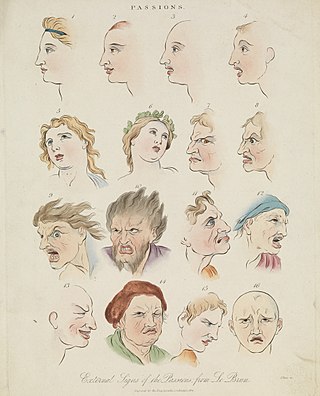Related Research Articles

Emotions are mental states brought on by neurophysiological changes, variously associated with thoughts, feelings, behavioral responses, and a degree of pleasure or displeasure. There is currently no scientific consensus on a definition. Emotions are often intertwined with mood, temperament, personality, disposition, or creativity.
In psychology, a mood is an affective state. In contrast to emotions or feelings, moods are less specific, less intense and less likely to be provoked or instantiated by a particular stimulus or event. Moods are typically described as having either a positive or negative valence. In other words, people usually talk about being in a good mood or a bad mood. There are many different factors that influence mood, and these can lead to positive or negative effects on mood.

In psychology, attitude is a psychological construct that is a mental and emotional entity that inheres or characterizes a person, their attitude to approach to something, or their personal view on it. Attitude involves their mindset, outlook and feelings. Attitudes are complex and are an acquired state through life experience. Attitude is an individual's predisposed state of mind regarding a value and it is precipitated through a responsive expression towards oneself, a person, place, thing, or event which in turn influences the individual's thought and action.

Amusement is the state of experiencing humorous and entertaining events or situations while the person or animal actively maintains the experience, and is associated with enjoyment, happiness, laughter and pleasure. It is an emotion with positive valence and high physiological arousal.
Attitudes are associated beliefs and behaviors towards some object. They are not stable, and because of the communication and behavior of other people, are subject to change by social influences, as well as by the individual's motivation to maintain cognitive consistency when cognitive dissonance occurs—when two attitudes or attitude and behavior conflict. Attitudes and attitude objects are functions of affective and cognitive components. It has been suggested that the inter-structural composition of an associative network can be altered by the activation of a single node. Thus, by activating an affective or emotional node, attitude change may be possible, though affective and cognitive components tend to be intertwined.

Affect, in psychology, refers to the underlying experience of feeling, emotion or mood.

Divergent thinking is a thought process or method used to generate creative ideas by exploring many possible solutions. It typically occurs in a spontaneous, free-flowing, "non-linear" manner, such that many ideas are generated in an emergent cognitive fashion. Many possible solutions are explored in a short amount of time, and unexpected connections are drawn. Following divergent thinking, ideas and information are organized and structured using convergent thinking, which follows a particular set of logical steps to arrive at one solution, which in some cases is a "correct" solution.
Dispositional affect, similar to mood, is a personality trait or overall tendency to respond to situations in stable, predictable ways. This trait is expressed by the tendency to see things in a positive or negative way. People with high positive affectivity tend to perceive things through "pink lens" while people with high negative affectivity tend to perceive things through "black lens". The level of dispositional affect affects the sensations and behavior immediately and most of the time in unconscious ways, and its effect can be prolonged. Research shows that there is a correlation between dispositional affect and important aspects in psychology and social science, such as personality, culture, decision making, negotiation, psychological resilience, perception of career barriers, and coping with stressful life events. That is why this topic is important both in social psychology research and organizational psychology research.
One way of thinking holds that the mental process of decision-making is rational: a formal process based on optimizing utility. Rational thinking and decision-making does not leave much room for emotions. In fact, emotions are often considered irrational occurrences that may distort reasoning.

Determination is a positive emotional feeling that involves persevering towards a difficult goal in spite of obstacles. Determination occurs prior to goal attainment and serves to motivate behavior that will help achieve one's goal. Empirical research suggests that people consider determination to be an emotion; in other words, determination is not just a cognitive state, but rather an affective state. In the psychology literature, researchers have studied determination under other terms, including challenge and anticipatory enthusiasm; this may explain one reason for the relative lack of research on determination compared to other positive emotions.
Flourishing is "when people experience positive emotions, positive psychological functioning and positive social functioning, most of the time," living "within an optimal range of human functioning." It is a descriptor and measure of positive mental health and overall life well-being, and includes multiple components and concepts, such as cultivating strengths, subjective well-being, "goodness, generativity, growth, and resilience." Flourishing is the opposite of both pathology and languishing, which are described as living a life that feels hollow and empty. It is a central concept in positive psychology, developed by Corey Keyes and Barbara Fredrickson.
Positive affectivity (PA) is a human characteristic that describes how much people experience positive affects ; and as a consequence how they interact with others and with their surroundings.
Group affective tone represents the consistent or homogeneous affective reactions within a group.
Eddie Harmon-Jones is professor of psychology at the University of New South Wales. He is recognized for his research on social neuroscience, cognitive dissonance, and the motivating aspects of emotions.
Positive psychology is defined as a method of building on what is good and what is already working instead of attempting to stimulate improvement by focusing on the weak links in an individual, a group, or in this case, a company. Implementing positive psychology in the workplace means creating an environment that is more enjoyable, productive, and values individual employees. This also means creating a work schedule that does not lead to emotional and physical distress.
The neurocircuitry that underlies executive function processes and emotional and motivational processes are known to be distinct in the brain. However, there are brain regions that show overlap in function between the two cognitive systems. Brain regions that exist in both systems are interesting mainly for studies on how one system affects the other. Examples of such cross-modal functions are emotional regulation strategies such as emotional suppression and emotional reappraisal, the effect of mood on cognitive tasks, and the effect of emotional stimulation of cognitive tasks.
A functional account of emotions posits that emotions facilitate adaptive responses to environmental challenges. In other words, emotions are systems that respond to environmental input, such as a social or physical challenge, and produce adaptive output, such as a particular behavior. Under such accounts, emotions can manifest in maladaptive feelings and behaviors, but they are largely beneficial insofar as they inform and prepare individuals to respond to environmental challenges, and play a crucial role in structuring social interactions and relationships.
In cognitive psychology, the affect-as-information hypothesis, or 'approach', is a model of evaluative processing, postulating that affective feelings provide a source of information about objects, tasks, and decision alternatives. A goal of this approach is to understand the extent of influence that affect has on cognitive functioning. It has been proposed that affect has two major dimensions, namely affective valence and affective arousal, and in this way is an embodied source of information. Affect is thought to impact three main cognitive functions: judgement, thought processing and memory. In a variety of scenarios, the influence of affect on these processes is thought to be mediated by its effects on attention. The approach is thought to account for a wide variety of behavioural phenomena in psychology.

Coaching psychology is a field of applied psychology that applies psychological theories and concepts to the practice of coaching. Its aim is to increase performance, self-actualization, achievement and well-being in individuals, teams and organisations by utilising evidence-based methods grounded in scientific research. Coaching psychology is influenced by theories in various psychological fields, such as humanistic psychology, positive psychology, learning theory and social psychology.
References
- 1 2 "Alice M. Isen". isen.socialpsychology.org. Retrieved 2021-09-18.
- 1 2 3 4 Fredrickson, Barbara (2013-07-18). "Remembering Alice M. Isen". APS Observer. 26 (7).
- ↑ Anolli, Luigi (2006). From Communication to Presence: Cognition, Emotions, and Culture Towards the Ultimate Communicative Experience : Festschrift in Honor of Luigi Anolli. Amsterdam: IOS Press. p. 169. ISBN 1586036629.
- ↑ Kaszniak, Alfred W. (2001). Emotions, Qualia, and Consciousness: Proceedings of the International School of Biocybernetics, Casamicciola, Napoli, Italy, 19-24 October 1998 . River Edge, NJ: World Scientific. pp. 509. ISBN 9810241658.
- ↑ Engineering, National Academy of (2005). Frontiers of Engineering: Reports on Leading-Edge Engineering from the 2004 NAE Symposium on Frontiers of Engineering. Washington, D.C.: National Academies Press. p. 127. ISBN 0309095476.